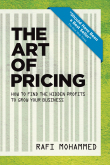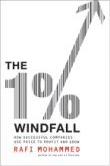Are Publishers Becoming Too Greedy With Their Ebook Prices?
Remember the days when publishers were fuming over $9.99 ebook prices? Well it appears the pricing pendulum is swinging in the opposite - more expensive - direction. In a recent Wall Street Journal article (“Ebook Readers Face Sticker Shock”), Jeffrey Trachtenberg notes that some ebook prices are creeping into the mid-to-high teens. Also, in some cases, ebooks are even priced higher than their print counterparts. As a pricing strategy consultant, I’d like to offer the following advice when setting ebook prices.
It’s unclear if ebooks are more valuable to readers than print. Sure, ebooks are convenient to purchase, transport, and store. However, there are negative attributes too. For instance, they are difficult-to-impossible to share, cannot be resold, and it’s debatable how the reading experience stacks up to print. When considering the value readers place on ebooks relative to print counterparts, both the positive as well as negative attributes need to be considered.
The general value of books is decreasing. When low priced substitutes - new next best alternatives – enter a market, prices usually have to be lowered. Remember when purchasing a set of encyclopedias was a major investment? The reason why Encyclopedia Britannica can’t reap the high prices that it used to command is because low priced substitutes became available. The publishing industry today is experiencing a similar influx of lower priced substitutes.
Many authors are self-publishing and setting lower retail prices. In addition, there are an increasing number of next best alternatives to big name publisher books. The Internet, for instance, provides a variety of reading options. Even other leisure activities such as video games are credible – and cheaper – substitutes. Our fledgling economy has also lowered the amount that readers are willing to pay for books.
Initial pricing devalued ebooks. Consumers remember that e-books were initially priced low. As Netflix recently discovered, it’s difficult to increase prices once a “base price” is embedded in the minds of consumers. A low “rollout” price devalues a product and it’s tough to reorient consumers’ perceptions of value.
So are all ebooks doomed to be, say, $13.99 or lower? Not necessarily – the key is to figure out which books merit – based on value – higher prices. Reference or classic books (that will be reread over time) are more valuable - and hence can be priced higher - than a throw-away summer novel. Similarly, premiums can be levied for unique specialized books with few next best alternatives. Finally, there may be an opportunity to boost prices for books targeted towards consumers who highly value the e-format (younger or technologically inclined readers).
Ebooks are a giant red bow wrapped gift to publishers. The numerous cost advantages make digital immensely more profitable relative to print. Even if consumers value books less, publishers can reduce prices and still grandly profit. My advice is to temper the urge to set unrealistically high e-book prices and strategically determine which books can command a digital premium. Then…sit back and relax and enjoy the financial e-windfall.
Readers' Comments on This Blog Entry
Your last paragraph actually encapsulates why I'm rarely willing to spend more than $13.99 on an eBook, and even then a technical eBook with few next-best alternatives at that. I, along with most people who read eBooks I'd presume, am aware that digital distribution is much less costly for publishers. While I don't begrudge any company a windfall, I think that consumers should benefit just as much from the advances in technology as the merchants. When those same merchants try to sell the same content through a cheaper (for them) distribution method at the same price as their more expensive distribution method, I feel taken advantage of, so I vote "no" with my dollars. So, to put it succinctly, I do think that publishers are being greedy in trying to push eBook prices to match their print counterparts, and because I know how cheap these books are to distribute, I will take a pass when I feel they are trying to take advantage of me.





These Ebook publishers are going to keep pushing the price envelope until some 15 year old kid figures out how to file share books, a-la-Napster. Then the publishers will be in the same boat as the record companies - Arrogant, tone deaf and upside down financially.